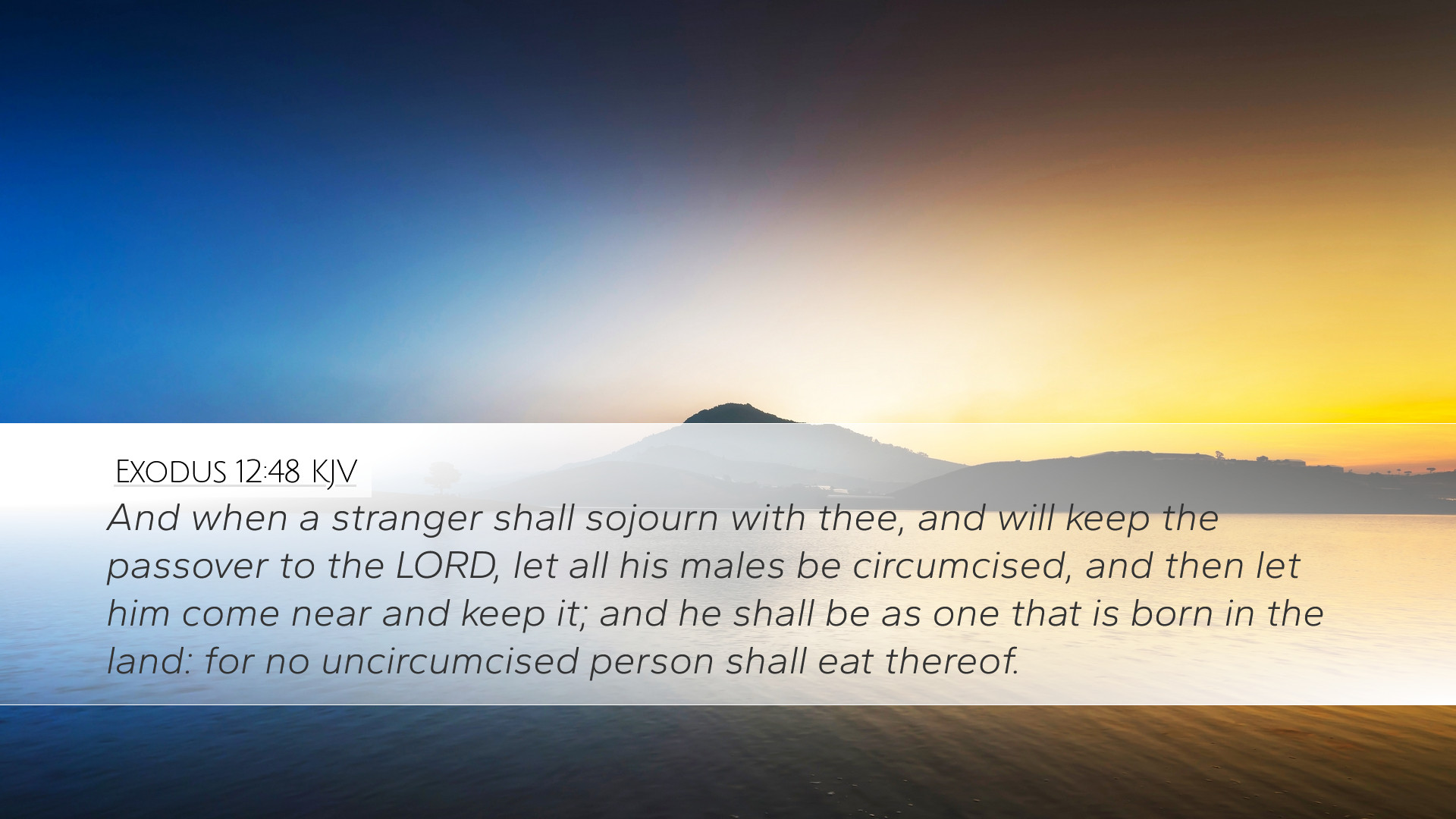Commentary on Exodus 12:48
Verse: “And when a stranger shall sojourn with thee, and will keep the passover to the Lord, let all his males be circumcised, and then let him come near and keep it; and he shall be as one that is born in the land: for no uncircumcised person shall eat thereof.” (Exodus 12:48, KJV)
Introduction
The verse in question is pivotal in understanding the nature of inclusion within the covenant community of Israel as well as the conditions placed upon those who desire to partake in the sacred observance of the Passover. It emphasizes the importance of circumcision as a prerequisite for communion with God's people and highlights both the physical and spiritual dimensions of belonging.
Contextual Analysis
In the broader context of Exodus 12, we find the narrative of the first Passover—a celebration that marked Israel’s deliverance from Egypt. The institution of the Passover was not only a sign of God's judgment upon the Egyptians but also an act of divine mercy upon His covenant people. This verse shows how the Passover extends beyond the natural-born Israelites to include the sojourner, provided they meet specified conditions.
Matthew Henry's Insights
Matthew Henry emphasizes that this provision for the stranger reflects God’s compassionate character. He points out that it opens the door for the non-Israelite to participate in the covenant community, which signifies the inclusivity of God's salvific work. Henry notes that the act of circumcision symbolizes an inward condition of the heart, representing the need for all believers, whether native or foreign, to undergo a spiritual transformation.
Albert Barnes's Explanation
Albert Barnes elaborates on the significance of circumcision as a necessary rite for participation in the Passover. He states that circumcision serves as a mark of covenant identity, separating the believer from the world. Barnes observes that the requirement for males underscores the household's responsibility, where the male leader's covenant faithfulness reflects upon those within his household. This reinforces the principle of corporate responsibility in the covenant community.
Adam Clarke's Commentary
Adam Clarke connects the act of circumcision with the overarching theme of obedience to God's commands. He posits that this verse teaches us about the necessity of fulfilling the law as a means to approach God’s holy practices. Clarke highlights that the stranger must be fully integrated into the community to partake in sacred realities, thus underscoring the importance of commitment to the covenant's stipulations.
Theological Implications
This verse carries profound theological implications for modern believers. The inclusion of the stranger prefigures the later New Testament revelation, where Gentiles are welcomed into the faith through the grace of Jesus Christ. It underlines the continuity of God’s plan for redemption across both Testaments.
Covenant Community
The establishment of familial and communal bonds is vital in understanding the corporate nature of salvation. Both Henry and Clarke emphasize that while individual faith is essential, it occurs within the context of community. This serves as a reminder to contemporary churches about the importance of welcoming those outside the faith while also teaching them the importance of the covenantal relationship with God.
Spiritual Circumcision
One of the deeper insights derived from this text is the concept of “spiritual circumcision” as referenced in the New Testament (Colossians 2:11). The physical act of circumcision serves as a type that points to the transformative work of the Holy Spirit in the believer's life. As Paul teaches, true inclusion into God’s family is not merely about external rituals but a heart directed toward God in faith and obedience.
Practical Applications for Pastors and Scholars
- Emphasize Inclusivity: Encourage the church to be a welcoming community, allowing those who seek God to find acceptance and a place within the body of Christ, echoing the sentiments of Exodus 12:48.
- Teach Covenant Responsibility: Highlight the importance of faithful living in accordance with God’s commands as a testimony to the surrounding community, drawing parallels to the Israelites’ obligations.
- Focus on Inner Transformation: Remind congregants that true participation in God’s community requires not just adherence to external rites but also internal change—spiritual circumcision of the heart.
Conclusion
Exodus 12:48 serves as a powerful reminder of God's covenantal grace and the call to holiness. This verse opens discussions about inclusion, identity, and the sacredness of community within faith. As esteemed commentaries highlight, the call for circumcision points to a deeper spiritual reality that engages both scholars and laypersons in the understanding of what it means to truly belong to God's people.


